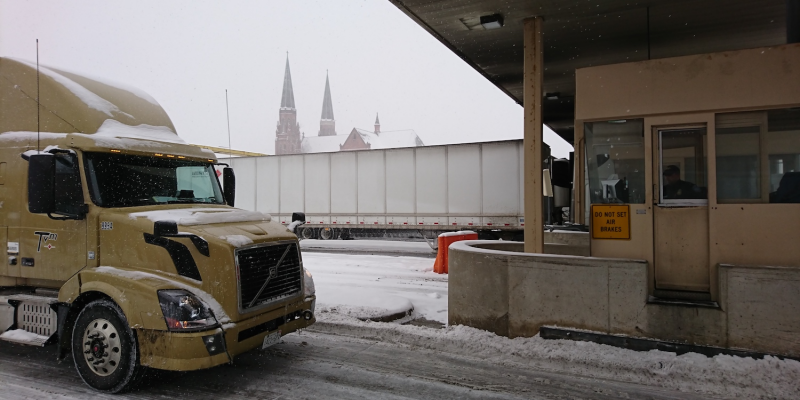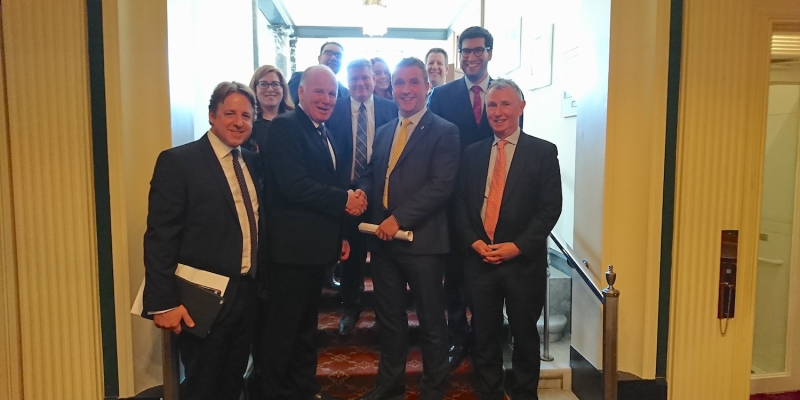- Britain will have plenty of trade partners outside the EU after Brexit, writes Marcus Fysh, the Conservative Member of Parliament for Yeovil.
- “The Cabinet has been leaking scary assessments which do not account for the situation properly and actually damage the national interest,” he says.
- One senior foreign trade official in North America told us “there was no way they would allow impact assessments of their different negotiating positions to be published.”
- “Just-in-time supply chains can be maintained without being in a ‘single market’ or ‘customs union’.
- “Gloomy forecasts about catastrophic UK loss of EU trade, and consequent reductions in productivity and foreign direct investment for the whole UK economy for all of the next 15 years, are well overdone.”
Britain’s International Trade Committee was warmly welcomed in the US and Canada last week. Key policymakers and officials are excited about the prospect of making deep and modern free-trade agreements with the UK containing high levels of services access. While we want to maintain efficient European trade links, deals with like-minded countries further afield could greatly benefit our economies and take global growth and trade to the next level.
We mustn’t let negative domestic politics get in the way of inspiring confidence in our biggest investors and allies. The Cabinet has been leaking scary assessments which do not account for the situation properly and actually damage the national interest. One senior foreign trade official told us there was no way they would allow impact assessments of their different negotiating positions to be published, however made.
North American multinationals, officials and policymakers want to see we have ideas and energy to make leaving the EU work with certainty in the process. Now is the time to make firm proposals for trade with or without a deal and to work to implement them independent of discussions with the EU.
It was instructive for the committee to see how the land border at Detroit operates, so we can advise on modern systems to deliver the controls and information necessary to maintain just-in-time integrated supply chains in a way appropriate to our borders.

Managers of Ford's assembly line in Detroit can call up engines from their Canadian sister company and have them on site within just a few hours. They say their trucks effectively "just slow down" when crossing the border. Customs declarations are pre-made electronically and trusted trader systems enable them to cross quickly, usually meaning just a short delay while waiting to be put into the trusted-trader line to be checked rapidly and waved on their way.
US border officials maintain that the time most trucks wait to cross is 12 minutes. Only 3% are pulled aside for more time-intensive X-ray checks that take another 8-10 minutes, and of these 99% carry on without further investigation. If drivers need to release a customs bond they also need to visit a physical office, which takes more time. But the intensive checks can also take place 50 or 60 miles away from the border itself.
While you need infrastructure for similar processes, it proves that just-in-time supply chains can be maintained without being in a "single market" or "customs union". Gloomy forecasts about catastrophic UK loss of EU trade, and consequent reductions in productivity and foreign direct investment for the whole UK economy for all of the next 15 years, are well overdone.
Regulatory cooperation can give advance mutual comment on emerging standard changes without rules set by Brussels for our domestic economy - it is a normal part of global business to tailor production for particular export standards.
With proper policy application established trading relationships are less likely to unravel given their sunk costs, contractual obligations, importers' resource limitations, and the policy levers available to preserve them. To get technical for a minute, it should not be assumed that past "gravity" correlations of trade growth to proximity of trading partners should simply be applied in reverse to already established relationships and integrated supply chains. It is also not credible for the gloomy forecasts to assume no openness to trade and ideas as the basis for lower long-term productivity and investment.

Leaving the EU is not a costless exercise. For 40 years the UK has not had to think seriously about trade and its mechanisms and resource and application to rebuild them. However, our ambition has been limited to seeking economic gain within the EU, often in return for more EU integration, and often by importing lower-cost labour.
Outside the EU we can look at our options more dynamically. We can focus on incentivising skills development, infrastructure, investment, innovation and research in the public and private sectors. We can collaborate in science and future industries with the whole world, not just the EU. We can unleash pent-up entrepreneurial forces. There will be some costs, for example, in being able to trace and potentially reshape some parts of supply chains and make the right declarations, but policy can be turned to addressing these issues and making the overall business environment even more competitive.

In key service and knowledge sectors the UK and US are world leaders. We can optimise returns from drug discovery and patents to make health solutions more readily available. We can innovate together to provide financial and technological solutions to the world's problems.
Those involved in decision-making need to properly value the dynamic effects and opportunities of leaving the European Union, while maintaining European supply chains, and of modern free-trade agreements and arrangements with other nations and blocs.
One place to start would be the US ITC's report on the potential for the US in TPP, which modelled its effects in a dynamic, qualitative way that is in my view more appropriate to assessing the potential of modern trade agreements.
At this historic moment, simply to re-hash old ways of thinking and forecasting would be a serious mistake.
Marcus Fysh is the Conservative Member of Parliament for Yeovil.


